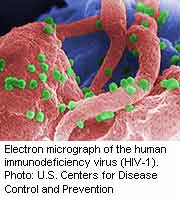Studies show high rates for all-oral, interferon-free 3D plus ribavirin regimen, ledipasvir + sofosbuvir
TUESDAY, Feb. 24, 2015 (HealthDay News) — For patients with hepatitis C virus (HCV) genotype 1 and HIV coinfection, new regimens are effective and correlate with high rates of sustained virologic response (SVR) after treatment, according to two studies published online Feb. 23 in the Journal of the American Medical Association.
Mark S. Sulkowski, M.D., from Johns Hopkins University in Baltimore, and colleagues conducted an open-label trial at 17 sites in the United States and Puerto Rico. Sixty-three patients with HCV genotype 1 and HIV-1 coinfection received the all-oral 3 direct-acting antiviral (3D) regimen of ombitasvir, paritaprevir (co-dosed with ritonavir), dasabuvir, and ribavirin for 12 or 24 weeks. The researchers found that 94 and 91 percent, respectively, of those receiving 12 or 24 weeks of 3D and ribavirin achieved SVR at post-treatment week 12 (SVR12). Fatigue, insomnia, nausea, and headache were the most common treatment-emergent adverse events (48, 19, 18, and 16 percent, respectively).
Anu Osinusi, M.D., M.P.H., from the University of Maryland in Baltimore, and colleagues examined the rates of SVR and adverse events in 50 previously untreated patients with HCV genotype 1 and HIV co-infection following a 12-week treatment with ledipasvir (90 mg) and sofosbuvir (400 mg). The researchers found that 98 percent of patients achieved SVR12 and one patient experienced a relapse at four weeks post-treatment. The most common adverse events included nasal congestion and myalgia (16 and 14 percent, respectively).
“The high SVR rates in these two studies suggest that future barriers to prevention of unnecessary deaths due to HCV may be related to failures of the health care system,” writes the author of an accompanying editorial.
Several authors in the Sulkowski study disclosed financial ties to pharmaceutical companies, including AbbVie, which funded the trial. Several authors from the Osinusi study disclosed financial ties to pharmaceutical companies, including Gilead Sciences, which provided the study drug and partially funded the study.
Copyright © 2015 HealthDay. All rights reserved.








